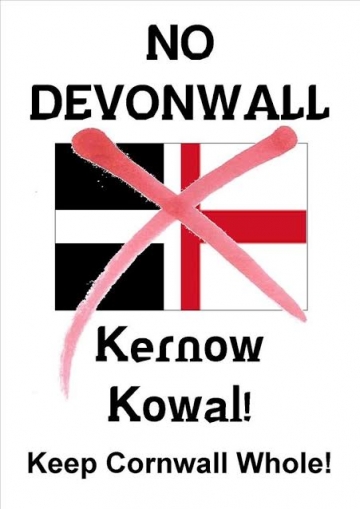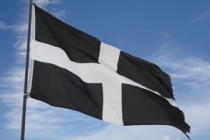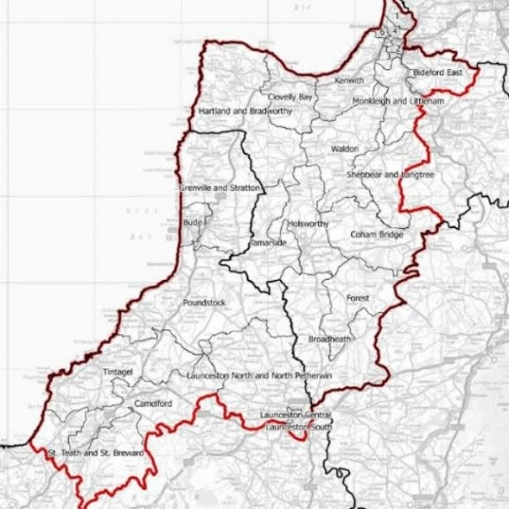Cornwall - Campaign Against 'Devonwall' Continues
News from Kernow Matters To Us:
In its ongoing campaign to call the proposals of the Boundary Commission to account wherein a cross-border constituency known as 'Devonwall' has been proposed, ‘Kernow Matters’ has sent the following letter to the Prime Minister, Government Ministers and Cornwall's MPs with additional copies sent to the Party Leaders of all opposition parties in the Westminster Parliament as well as to selected members of the House of Lords seeking their assistance in doing all they can to obstruct the threat to Cornwall's ancient border.
Further, copies of the letter have been sent to the Council of Europe, UNPO and FUEN in respect of possible legal breaches of the Framework Convention for the Projection of National Minorities into which the Cornish people were admitted during 2014.
The letter has been sent against a growing background of anger at the proposals.
The chair of Cornwall Liberal Democrats, Frances Tippett, has said: “We support the principle of equally sized constituencies, but only if flexibility is applied to take account of natural communities, and this vast rural constituency could hardly be seen as that.” “As the Electoral Reform Society point out, the real scandal here is that the poor and marginalised will be less not more represented in our democracy, and so I urge local people on both sides of the border to hold their Conservative MPs to account and to oppose these unnecessary and damaging proposals.”
Conservative MP Geoffrey Cox has said that there are ‘more important things to focus on’ within the constituency at this crucial time than the ‘flawed’ notion of a hybrid Devon-Cornwall seat’. He said: “We should not necessarily assume these proposals will go through. The previous proposals released a few years ago came to nothing and there is a fair chance that this will happen again.”
Mayor of Camelford Rob Rotchell said, “I think I am probably going to have to agree with everything that has already been said, we need to retain our Cornish heritage and identity.” “Overall I am completely in support of our minority status and am fully opposed to these proposals.”
Launceston’s Mayor Brian Hogan has raised his concerns over the Boundary Commission’s proposal and said, “Everyone has a right to be proud of their roots and their heritage. With that in mind, Cornwall has been given national minority status recently, so why would the Boundaries Commission seek to overturn a thousand years of history?” “I think that the Cornish are very proud of their national identity, which is only right, and perhaps because of political red tape something may be forced upon them that the majority of Cornwall do not want.” “Having spoken to several local residents recently, they are opposed to any changes with the boundary.”
The Leader of Cornwall Council, Councillor John Pollard has confirmed his total opposition to the creation of a cross border constituency between Cornwall and Devon and has written to the Government criticising the "inequitable and unlawful" proposal put forward by the Parliamentary Boundary Commission. This announcement was made following Member support for a 'Opposition to Devonwall Constituency 'motion at the meeting of the full Council on 17 May, proposed by Councillors Dick Cole and Andrew Long.
‘Kernow Matters’ which has a substantial following on social media has received thousands of messages of support for its stand against ‘Devonwall’ accompanied by strong criticism of the Boundary Commission and Westminster Government.
Meanwhile, unelected civil servant Sam Hartley, secretary to the Boundary Commission quango, said last week: “They are just the commission’s initial thoughts — during the next 12 weeks we want people to take a look and tell us what they like and don’t like about our proposals."
This is a remarkable volte face following his original arrogant outburst in the media where he described ‘Devonwall’ as being 'inevitable'!
Kernow Matters letter follows:
"Cross Border Constituency Devon & Cornwall – ‘Devonwall’
We write with a deep sense of concern over the Boundary Commission’s proposal for a cross border Devon & Cornwall Westminster Parliamentary Constituency, now being commonly referred to as ‘Devonwall’.
We share that concern with a huge number of other people and even the member for Torridge in Devon, Geoffrey Cox MP (Conservative) who has stated: "……I will say that I am disappointed that the Commission has resorted once again to the flawed notion of a hybrid Devon-Cornish seat.” , "I believe it is not desirable to have a constituency that straddles the divide.” , "These two counties are very distinct and have strong separate identities."
There is growing anger, unrest and opposition to the ‘Devonwall’ proposal from across the whole community and this is based upon the following amongst others:
1. Areas with the lowest levels of registration are often those that already have the least voice in politics. Young people, some ethnic minority groups and those in the private rented sector are all less likely to register to vote than others. That makes many of them effectively cut out of the new political map when those areas get less representation than other areas. Everyone deserves representation, not just those on the register.
2. The review is being undertaken on the basis of a register that’s nearly a year out of date - excluding over two million people who signed up between December and June. That means some regions are two seats short of what they are owed. It would be much fairer – and would make more sense - to draw boundaries based on eligible population rather than an incomplete electoral register. In Cornwall alone, 52,500 homes are to be built in these coming years meaning a large increase in population.
3. Then we come to the carving up of communities themselves. The rigid 5% threshold – the maximum difference in size between constituencies – means that some communities will be split up, while others will be merged and dragged into others.
4. But on top of that, the strict 5% difference limit poses the prospect of huge disruption every five years through sparking a boundary review for every election. Do we really want to spend infinite hours arguing about seat borders in the run up to every Westminster vote?
5. Of course, this is all happening alongside a reduction in the number of MPs – something that has a bizarre rationale when you think about it. Because the government argue shrinking the Commons will ‘cut the cost of politics’.
6. Yet we have a growing unelected House of Lords - and a shrinking elected one. The House of Lords is a super-sized second chamber – second only to China – and shockingly poor value for money. Surely it would be more democratic to address the crisis in the House of Lords than to cut the number of elected MPs? The last Prime Minister appointed 205 Peers over the past six years, at a cost of £13m already. If you want to reduce the cost of politics, you could do worse than starting there and cutting down our bloated upper house.
7. Cutting the number of elected Parliamentarians does have one effect though – and sadly it’s not a good one. If you reduce the number of MPs in Parliament without reducing the number of ministers, you increase the power of the executive and make it more difficult to challenge the government. And that in turn will reduce the ability for Parliament to do its job of holding the Government to account.
8. The Government talks about the need to 'make every vote count' through these changes. Yet the best way to do that is to give us a proportional and fair voting system.
9. We see that with the deeply unpopular ‘Devonwall’ seat that spans Cornwall and Devon – distinct areas with very distinctive identities and needs. Fair political boundaries are crucial to ensuring people are properly represented in Parliament: we shouldn’t tear apart close-knit areas in a rush to ‘equalise’ numbers.
10. The Cornish language was recognised officially in 2003 under the European Charter for Regional or Minority Languages and was initially supported by the UK government. This minimal funding was withdrawn during 2016 and has caused many to feel extremely bitter towards the Westminster Government. How many more insults are we expected to endure?
11. In April 2014, the Coalition Government recognised the people who spoke that language, the Cornish people, through inclusion in the Framework Convention for the Protection of National Minorities. The official governmental press release stated that “the decision to recognise the unique identity of the Cornish, now affords them the same status … as the UK’s other Celtic people, the Scots, the Welsh and the Irish.”
This landmark recognition came after many years of campaigning and, as a consequence, was greeted with publicly expressed joy across all of Cornwall’s communities as well as by Cornish people the world over.
Sadly, two years on, there is a growing frustration that central government is failing to act on the various articles within the Framework Convention.
12. The UK Government passed the Parliamentary Voting System and Constituencies Act, which stated that the number of seats in the UK parliament should be reduced to 600 and – unless specified in the legislation – the electorates for seats should be within 5% of the various averages for England, Northern Ireland, Scotland and Wales.
That Act does not recognise the territorial integrity of Cornwall and it's 1,000 year old boundary, and, as the legislation stands, the outcome of Boundary Review (based on the provisions within the Act and the present electorate of Cornwall) would inevitably include the creation of a cross-Tamar ‘Devonwall’ constituency taking in Bude and Launceston in Cornwall and Bideford in Devon.
13.It is since the Act was agreed, that the UK Government agreed the Cornish are covered by the auspices of the Framework Convention and our organisation contends that developing a cross Tamar parliamentary constituency would contravene the following constituent articles of the Framework Convention:
ARTICLE 3 – PARAGRAPH 2: “Persons belonging to National Minorities may exercise the rights and enjoy the freedoms flowing from the principles enshrined in the present Framework Convention individually as well as in community with others.”
ARTICLE 5 – PARAGRAPH 2: “Parties shall refrain from policies or practices aimed at assimilation of persons belonging to National Minorities against their will and shall protect these persons from any action aimed at such assimilation.”
Under these circumstances it would therefore appear that the legislation which guides the Boundary Review is in conflict with the Framework Convention which, as well as protecting the culture and identity of national minorities, also seeks to protect the political integrity of territories associated with such groups.
14. In the Parliamentary Voting System and Constituencies Act, the territories of other national minorities within the United Kingdom (namely the Scots, the Welsh and Northern Irish) are safeguarded and no seats can be proposed which would cross the land borders between England and Scotland or Wales.
Once again, a campaign is growing in Cornwall in defence of the border which was set over a thousand years ago in 936AD when King Athelstan set the boundary between English and Cornish at the high water mark of the eastern bank of the River Tamar.
15. It is difficult for people living elsewhere to understand the mind-set of the Cornish people and indeed, of many of the people of Cornwall, but as with Scotland and Wales, there is a strong and emotional attachment to the land and Cornwall’s time honoured boundary.
16. Dr. Merv Davey, The Grand Bard of the widely respected Cornish Gorseth, our College of Bards recently remarked: “Any recommendation that parts of Cornwall are placed within Devon constituencies would be a disaster for Cornish democracy, heritage, culture and our national identity.”
17. Cornwall Council unanimously opposes the imposition of a Cross Border Constituency and it's Leader, Cllr. John Pollard has even called the 'Devonwall' proposal unlawful. Other too believe this Cross Border Constituency breaks the law and some have even talked of a Judicial Review
18. Cornwall has a unique legal place within the constitution as recognised by such scholars as Dr John Kirkhope. Cornwall is different legally from Devon and indeed, most other places
19. An open public opinion poll run in Cornwall by commercial broadcaster Pirate FM returned results on 15th September, 2016 which indicated 94% of people in Cornwall are opposed to 'Devonwall'. A similar poll run by the Daily Mirror indicates 89% are opposed to the changes.
20. Cornwall should be given an exemption similar to the ones given to the Orkney Islands and the Isle of Wight, both of which were allowed to deviate from the '5% of average' size rule.
21. Cornwall has devolved Local Government through the Devolution Deal, recently agreed with HM Government and our democracy will be seriously inhibited if this does not coincide with Parliamentary Constituency boundaries.
22. Parliament is less respected now than it ever has been and the imposition of 'Devonwall' would compound that growing mistrust.
We have received correspondence from people aged from in the twenties right up to their eighties who are so angry, they propose demonstrating along the road links between Devon and Cornwall and celebrities from London with links to Cornwall talking of marching up the M5!
For these reasons, we actively seek your support in achieving an urgent amendment to the Parliamentary Voting System and Constituencies Act 2011 that will allow the Boundary Commission to recognise Cornwall as the distinct entity which it truly is.
Further, we believe that Cornwall and the Isles of Scilly could be represented by five seats as in the past.
Yours most sincerely
for and on behalf of Kernow Matters"




- Mair Williams's blog
- Log in to post comments





